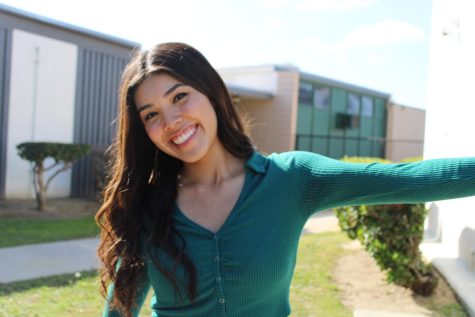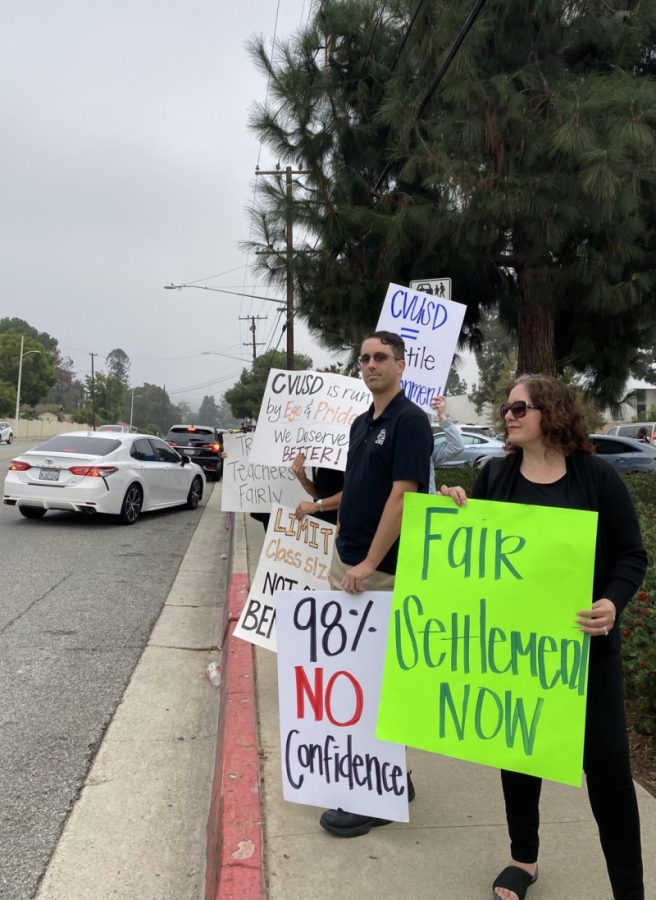Negotiations between the CUEA and C-VUSD prompt teachers to take action
Many South Hills High School teachers have been wearing black and have been gathering with signs in front of their campus on Thursday mornings to protest in hopes of gaining momentum in their ongoing contract negotiations between the Covina Unified Education Association (CUEA) and the Covina-Valley Unified School District (C-VUSD).
The South Hills High School site CUEA representative, Kevin Colwell who has been teaching at South Hills for 6 years, has been participating in protests since May 2022. He and a group of teachers at South Hills have been protesting over various contract negotiation topics such as health benefits, salary increases and special education teacher job responsibilities.
“I protest, just so people are informed about what’s going on, and to try to open a conversation of understanding each other more and just being more aware of what’s going on in our communities,” Colwell said.
Regarding health benefits, the district is proposing a plan that would provide current employees hired on or before June 30, 2022 free HMO Medical, Dental, Vision, and Life care as well as an Annual Medical Premium Plan Contribution for employee Dependent Coverage Contribution (this would increase annually). For employees hired after July 1, 2022, they would receive free HMO Medical, Dental, Vision, and Life care, however they would have a Maximum Annual Medical Premium Plan Contribution for Employee Dependent Coverage with a hard cap at $26, 998.80 for employees and their family.
Michelle Ramos, who serves as the CUEA head of bargaining has been a strong advocate for South Hills teachers. Ramos and her team have been working to resolve the negotiation between the two parties. Ramos explained the CUEA’s perspective on health benefit negotiations.
“We have medical, dental, and vision insurance because of our work. And the district would like to add what is called a hard cap. Our concern is, at the end of the day, we [employees] could make less money,” Ramos said.
Dr. Elizabeth Eminhizer, who has served as the Covina-Valley Unified School District Superintendent since April 2020, has shared the district’s perspective regarding health benefits. She has indicated that the district’s proposal would only impact new employees hired after July 1, 2022.
“We are looking at putting a cap not on their [new employee’s] benefits, they’d still get free benefits, free medical, free dental, free vision, free life, they would just have a $27,000 a year cap on their medical benefits,” Eminhizer said.
In addition to health benefits, contract negotiations also include proposals for salary increases. On November 10, 2022 both the district and CUEA agreed to a 5.3% salary increase effective July 1, 2022 for the 2021-2022 school year. As for the 2022-2023 school year, the CUEA has proposed a 10% raise on schedule retroactive to August 1, 2022 for all unit members while C-VUSD has proposed a 7% salary increase.
The CUEA believes 10% is reasonable considering the cost of living. “It’s average, it’s not outrageous. It sounds like a big number. But you know, we’ve [teachers] have been living on one or 2% raises our whole life and the cost of living goes up by more than one or 2% every year,” Ramos said.
C-VUSD believes that 7% is still reasonable for the cost of living and that the district needs to consider other costs in the budget.
“As a district, when we look at compensation, we have to also budget in how much we’re going to pay for each teacher or each employee and health and welfare, as well as we have what we call statutory,” Elizabeth Eminhizer said.
The third topic of negotiation is special education teacher responsibilities. C-VUSD proposed that starting in 2024, special education teachers would assume the duties and responsibilities of a case carrier, which would transition this role from school psychologists to special education teachers.
C-VUSD proposed that elementary school special education teachers would be provided 75 minutes each week to perform case carrier duties and their stipend would be increased to $4,014.00. Secondary school special education teachers would be provided one class period per day to perform case carrier duties and their stipend would remain at $1,338.00. Additionally, special education teachers would have access to site clerical support for the purposes of copying/mailing Individualized Education Program (IEP) documents and scheduling IEP meetings.
“There’s a very thoughtful plan in the proposal about professional development training transitioning over the years,” Eminhizer said.
The CUEA bargaining team has proposed a new special education salary schedule that will exceed the teacher salary schedule by 10%, rather than a stipend. Secondary school special education teachers would have one designated student-free period to conduct case carrier duties. Elementary, preschool and adult education special education teachers would have no less than four hours student-free minutes per week to conduct their case carrier duties. They propose that special education teachers will have access to site clerical support to copy/mail IEP documents and schedule IEP meetings.
“They [the C-VUSD district] want to take the work away from that group [school psychologists] and give it to our teachers. What we have asked for is a plan for how that’s going to happen. [CUEA proposes] compensation and time for our teachers. They [the district negotiating team members] don’t want to offer us a plan,” Ramos said.
Kevin Colwell shared that many of these negotiation topics could cause a division among teachers in the CUEA.
“There’s a little bit of like, ‘oh, it only affects these employees,’ and we don’t want to start grouping people as that’s your issue, that’s not my issue. We want to make sure every teacher feels they’re in the same boat with the same hardships as their colleagues, which isn’t being seen in negotiations they [the district] presented to us so far. It’s not very unifying,” Colwell said.
Michelle Ramos also explained how protests are not just about the negotiations being made, they’re also about being treated with more respect. Teachers spend years earning degrees that have cultivated them into quality, skilled educators, but for Ramos and many teachers in the CUEA, they don’t feel like they’re being treated that way.
“You don’t hire quality people with advanced degrees to treat them like they’re unskilled labor,” Ramos said.
As of November 2022, protests have continued as many South Hills teachers continue to support the CUEA and remain hopeful that a settlement will come before a strike.
“I don’t want anyone to think teachers want to strike. But we want to make sure that the offers we’re getting show that we’re valued by our district, that they see the work that we do, and they want to recognize the impact that we have,” Colwell said.
Your donation will support the student journalists of South Hills High. Your contribution will allow us to purchase equipment and cover our annual website hosting costs.

Hi! I’m Juju and I’m currently serving as an Editor in Chief of the South Hills Growl! I’ve waited since freshman year for a chance to join the journalism...

Hey, I’m Ashley! You might see me on the tennis courts, backstage, or doing work in the journalism room. I love setting goals for myself that will benefit...





